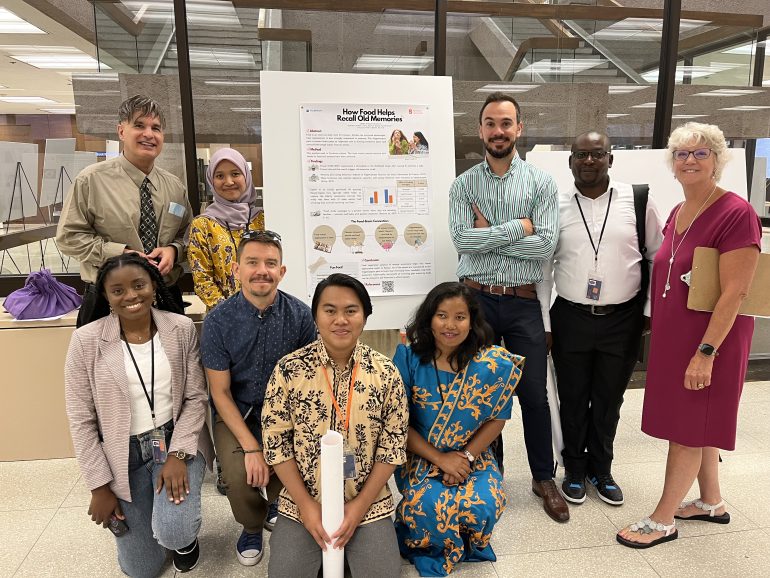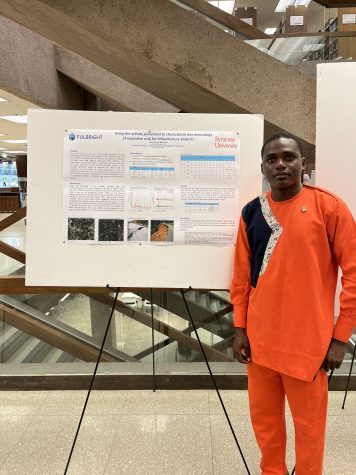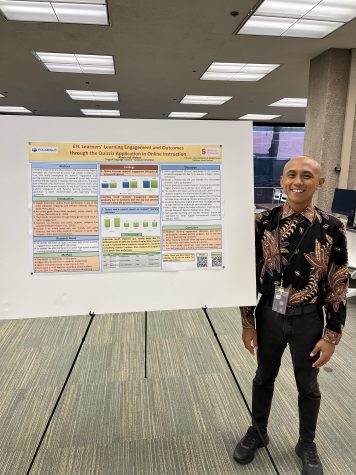Fulbright graduate students flexed their storytelling abilities Friday, Aug. 11 at the Fulbright Poster Session, an annual event that allows the international students the opportunity to present scholarly research topics to the public.
This year, 37 masters and Ph.D. students from 23 countries attended a pre-academic program at Syracuse University’s English Language Institute before matriculating into their degree programs at institutions across the United States. Sponsored by the U.S. Department of State’s Bureau of Educational and Cultural Affairs as part of its Fulbright Program and administered by the Institute of International Education, the scholars spent this time participating in a variety of workshops, field trips, and textual and oral communication courses. The students incorporated the resources and skills they acquired during their time at Syracuse into their poster presentations, allowing them to practice their presentation skills through repetition as attendees walk by.
“The event marks the culmination of a program that provides them with the confidence they need to embark on the next leg of their academic journey at different host institutions across the country,” says David Lind, director of International Programs. “International graduate students must master academic English and also learn to present their research in a manner that’s understandable to those not specialized in their domain.”
Translating Research into Storytelling
The Fulbright pre-academic program is designed to prepare international graduate students for academic life in the United States, which includes presenting academic research. Through textual and oral communication courses, students learn the value of storytelling and how to cut out their industry’s jargon, when necessary, in order to present research to those not well-versed in their field. Fulbright students can hone their casual storytelling skills on complex research topics while also improving their English language skills thanks to the repetition of the Fulbright Scholar Poster Session.
“The storytelling aspect of this project really came through in the presentations this year. Each student I spoke with this year couched their research in engaging narratives,” says Dylan Mohr, open scholarship librarian at Syracuse University Libraries. “They told me how their work was important both in terms of their discipline, but also how it related to me or things I engage the world in daily. To be able to communicate the intricacies of your work while also connecting with a diverse group of listeners is such a crucial skill.”
- Aspy Mbani, from the Republic of Congo, will be participating in the Fulbright program at Southern Illinois University.
- Alimin Adi Waloyo, from Indonesia, will be participating in the Fulbright program at Washington State University.
For Fulbright scholar, Aspy Mbani, the structure of the poster session allowed him to decipher the main points he wanted to share regarding his research topic.
“The poster project was an opportunity for me to try to sum up main ideas and make it easier for people to understand,” says Mbani. “It was not easy because there are a lot of things to share, but using the poster helped me to increase my ability to summarize the most important things.”
For Alimin Adi Waloyo, the Fulbright pre-academic program and the poster session laid the foundation for the skills he needs to thrive as a scholar in the United States as well as the rest of his academic career.
“I think that this kind of assignment is very useful because it teaches me several things,” says Waloyo. “One of them is time management, but also how to prepare everything before I create my poster, and how I’m doing research. In the future, we know how to present well in front of the audiences, and it’s also increased our confidence now and in the future.”
Continuing the Conversation with Open Access Publishing

The conversations continue as the Fulbright graduate students’ research topics will be published online and available for open access. SURFACE, the Syracuse University Institutional Repository, provides Fulbright graduate students with real-time data on their downloads, where people are downloading across the world, and how their work is being shared on social media, says Mohr.
“Open access is important for a number of reasons,” says Mohr. “First, making sure the incredible knowledge and work produced by these students can circulate in the world without barriers to access is what expands the scholarly conversation. Open access publishing supports a more equitable scholarly communication ecosystem—one that drastically reduces barriers to researchers.”
Open access publishing gives emerging researchers a boost of confidence and enables scholars to see the worth of their own work. The Fulbright poster session allows research topics to be presented from a different voice, allowing scholars to explore new avenues of the established topics.
“It’s crucial that students see that their voice matters, that their ideas and research circulate the world and make a difference,” says Mohr. “If you simply hand your final project to a professor or advisor at the end of a semester, then you never get to see how your work is valuable beyond the classroom. Open access publishing opens the door to new conversations, new debates, and new ideas. You never know who might be reading.”
About the English Language Institute
The English Language Institute, a department within the College of Professional Studies, at Syracuse University is a pre-degree program that prepares international students to succeed in their undergraduate and graduate degree programs. Established in 1979, this immersive year-round program allows international students the opportunity to learn English and culture in the heart of New York state.
By Hope Alvarez


